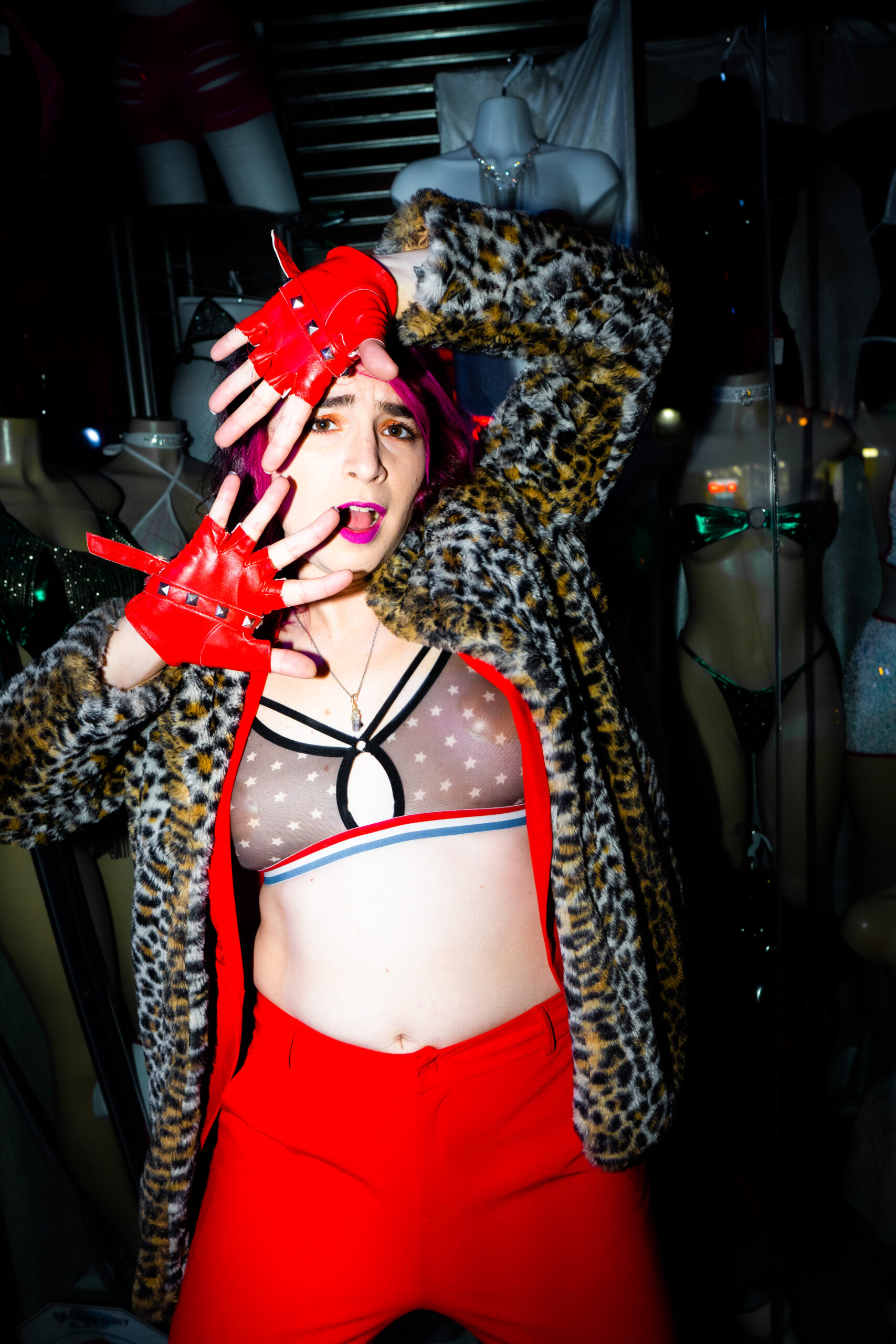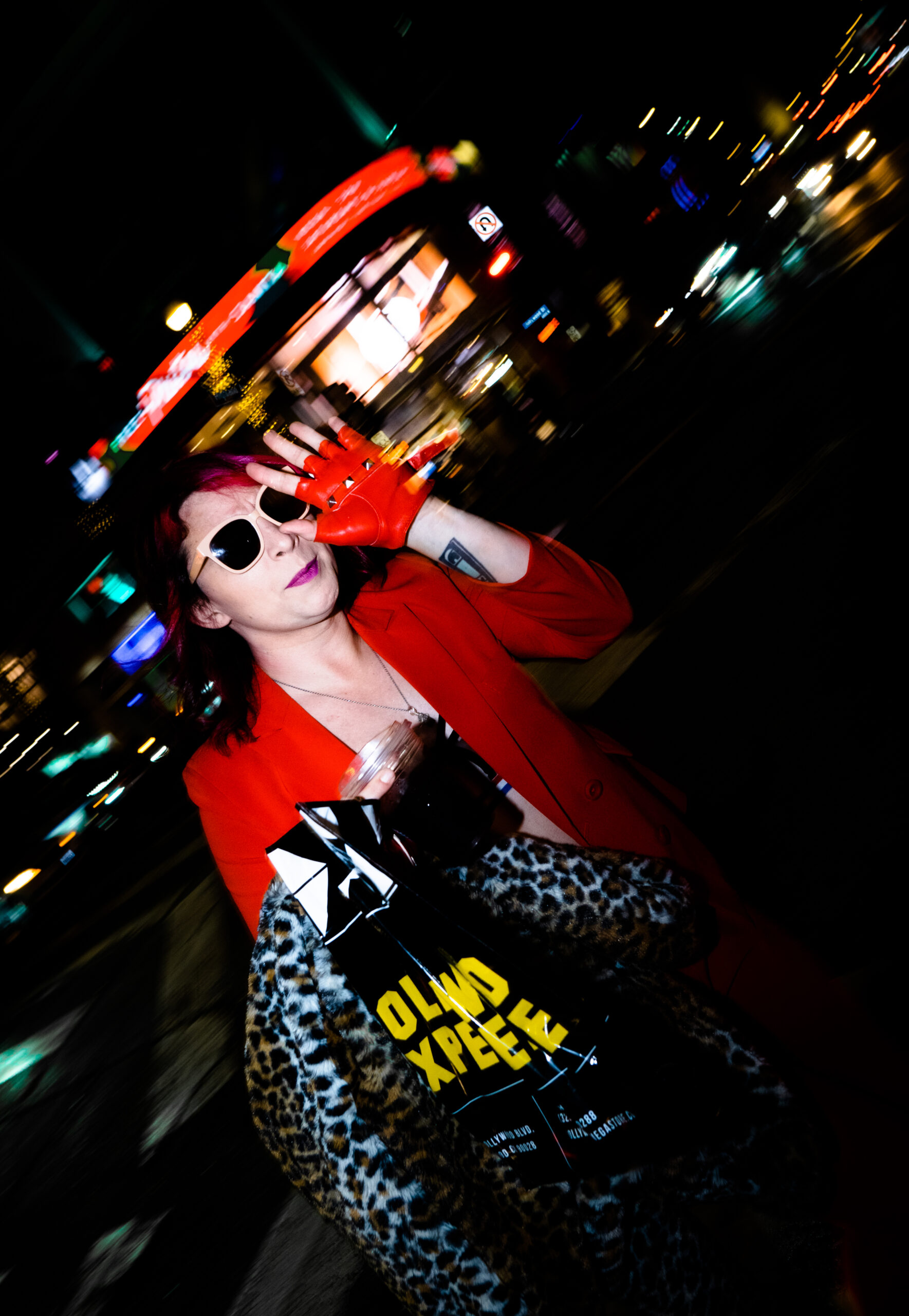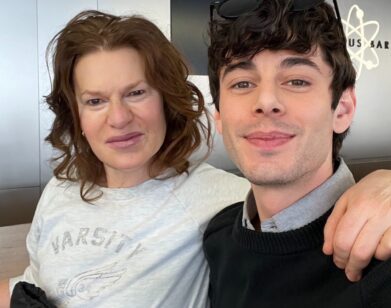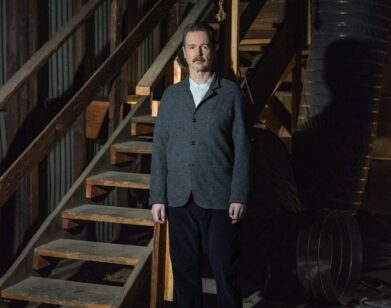DIRECTOR
“Most Queer Representation Is Horseshit”: Vera Drew, in Conversation With Bruce LaBruce
For Vera Drew, The People’s Joker started as a lark. After the release of Todd Phillips’ Joker in 2019, friend and eventual co-writer Bri LeRose half-jokingly Venmo’d Drew, who cut her teeth in the editing rooms of beloved comedies like Tim & Eric’s Bedtime Stories and I Think You Should Leave with Tim Robinson, with a proposition to make a spoof of the film. It was not long, though, before Drew found herself at work on a full-fledged narrative feature of her own, one in which she eschews many of the old comedy rules and adages she’d learned in pursuit of a sort of tonal and visual maximalism that careens between cartoon sequences and musical numbers, slapstick and coming-of-age-style vulnerability.
The result is The People’s Joker, a wild, multimedia fantasia that functions as both a story of trans self-discovery, centering Drew as the aspiring comedian Joker the Harlequin, and a withering send-up of the highly patriarchal worlds of stand-up, sketch comedy, and late-night. After the film’s premiere at the 2022 Toronto International Film Festival, which was preceded by a vaguely threatening letter from Warner Bros Discovery, The People’s Joker lingered for about 18 months in a kind of post-production limbo. But this past Spring, with the help of the distributor Altered Innocence, it finally hit theaters. Appropriately, the trailblazing filmmaker and photographer Bruce LaBruce counts himself as a fan of the film, so he and Drew got on a Zoom call last month for a wide-ranging chat about sobriety, camp, therapy, cartoon sex, ego death, and the trans experience.
———
BRUCE LABRUCE: Hi, Vera.
VERA DREW: Hi, Bruce. It’s so awesome to meet you digitally.
LABRUCE: Great to meet you, too. I like your David Lynch background there.
DREW: Thanks. I lost my mind after TIFF [Toronto International Film Festival] and needed a big art project to throw myself at, so I turned my office into the Black Lodge.
LABRUCE: That would help, yeah.
DREW: The ways we cope, you know?
LABRUCE: Because it was a kind of Lynchian experience, or Kafkaesque, maybe. We could start with that. I’m from Toronto. It’s a big festival. It was the world premiere, right?
DREW: Yeah, it was the world premiere, and I’d never even been to a film festival before-
LABRUCE: I know what that’s like after years of working on something and it all boils down to this one night at this one screening. I know you’ve been through this conversation a hundred times, but just to start off. When did the notification come and how did you react?
DREW: Oh, It was literally the night before our screening.
LABRUCE: Nice of them.
DREW: [Laughs] Yeah, it was really kind of them to wait till the last minute. I was devastated, and honestly, it was mostly because we had spent the entire day, my co-writer [Bri LeRose] and my co-star [Nate Faustyn], who plays The Penguin, drinking all day and celebrating after a long press day, and then I got this phone call. So I was in the streets of Toronto, just crying, and my zipper had also broken on these leather pants I was wearing, so I was just fully exposed in every way.
LABRUCE: Kind of a Mercury-in-retrograde moment.
DREW: Big time, yeah. And I’m sure you’ve experienced this, too. I’m curious, because the instant impression I got was that Toronto loves film. And maybe I just got spoiled because it was around TIFF, but the second we told TIFF what had happened, it wasn’t just TIFF that went to bat for us, but the entire film community in Toronto was like, “No, we’re going to screen this movie no matter what. We had a separate theater set up just in case.” I instantly felt like I had this safety net of people who really care about movies, and movies like the one I made. So it was really cool. It really felt like we were in the right place at the right time. Has that been your experience? Because you’re still in Toronto, right?
LABRUCE: Well, to be honest, I have a friend who I won’t name who had a film that was withdrawn from TIFF and he was really upset about it. Your film is just such a watershed film and about the trans experience, so I think that was part of the impetus to say, “This film has to be screened, because it’s historical.” And I think the fact that they did come in at the 11th hour… It was DC Comics, right?
DREW: Yeah. This was right after Discovery had bought Warner Bros, so the letterhead was from Warner Bros Discovery.
LABRUCE: After that first screening, can you remember what your feelings were?
DREW: I think I was kind of numb. Because the whole day after we got the letter, it was like one second we were screening, the next, we weren’t. Then we literally had to… I don’t know why this happened, but I guess we had to hijack our DCP from the people who had it internally at TIFF.
LABRUCE: Ah. There was espionage.
DREW: Yes, exactly. It was like a Bruce LaBruce movie.
LABRUCE: Like my movie The Misandrists, where they take over the theater and pull a gun on the projectionists, the lesbian-separatist-feminist terrorists, and force them to show lesbian porn.
DREW: I mean, quite honestly, the whole second and third act of my film would not be what it is if you had never made The Misandrists.
LABRUCE: Oh!
DREW: The Misandrists completely changed the way I thought about what a queer film could be and what you could say in it. So yeah, I’ve gotta say thank you. Let me kiss your ass for five seconds.
LABRUCE: Okay. One, two, three.
DREW: [laughs] No, don’t count. I am so inspired by the work you do and just blown away that I get to have this conversation with you. So thank you for being here and making the kind of films you do.
LABRUCE: Oh, thank you. I appreciate that. But getting back to one more thing, it’s so meta that they tried to shut you down that night at TIFF. Because it really is a complete mirror of what goes on in the movie with what happens to your character. I mean, did that blow your mind?
DREW: Totally. I mean, I’m very New Agey– like, The People’s Joker really was a big chaos-magic ritual. So I was not surprised, but I was also shaken. Biblically shaken like, “Oh my god, it’s happening.”
LABRUCE: It’s sort of like a cascade of synchronicities, right?
DREW: Oh, completely, right down to my actual professional day-to-day and the conversations I was having. Like, having annoying agents tell me I should wear Joker makeup to general meetings. It was very like, “Oh, this is the movie now playing out.” And getting into multiple relationships with comedians in that year’s time, too, that were more toxic relationships like I’d processed in the film. It really felt like I had this experience, and the experience of getting the movie out there was like me finally learning the lessons of the film that I had laid out for myself: how to stand proud and be myself in this industry as a queer person in a time where, I don’t know, most queer representation is horseshit.
LABRUCE: Well, I think that experience probably galvanized you. It just encapsulated everything that you’ve gone through to try to get the film made in the first place. People telling you, “You can’t make a movie like this. Nobody is going to watch it. The script is ridiculously complicated.” We both know what it’s like to make an independent queer film with a low budget. It’s harder, because you don’t have the whole system supporting you. You’re, in fact, working against the system. I’m guest-editing an issue of Queer Majority and you wrote an amazing piece describing the whole experience for you.
DREW: Oh, thank you.
LABRUCE: And in that, you describe how it made you into a Zen master, almost. I mean, you’re getting up in the morning and doing yoga asanas and TM [transcendental meditation]. Talk a little bit about that, because I practice yoga, and have since I was a teenager, but it’s really hard for me to do it in the morning and sometimes I struggle with my practice.
DREW: When it comes to making art, I’ve always really sacrificed my sanity and my physical health. And making The People’s Joker was an experience of hopefully learning how to not do that anymore, because it’s just not sustainable. It kind of is sustainable in your 20s, but really only if you’re like a maniac on drugs or something, which I was.
LABRUCE: Yeah. We have to remember, Fassbinder only lasted till he was 37. So I mean, it’s definitely not sustainable.
DREW: I turned 35 this year, and I really met my own limits after TIFF. I haven’t really described it this way publicly before, but I feel safe saying it here. I really was almost pre-psychotic in a way after TIFF. It showed me that making art is really powerful. And when you wrap your identity into this, when you project your will out there like that, it can be very destructive on your brain and your body. I think specifically about doing psychedelic drugs or something, people have experiences where they’ll literally feel like they’re seeing the Godhead, and billions of souls attached to one giant entity and stuff. That was what the experience of making this film was like.
LABRUCE: And also the ego death, you know?
DREW: Yes.
LABRUCE: You can’t get to the Godhead until you have the ego death, which is like experiencing your own death. It’s interesting, because I had a similar experience with my movie Super 8 ½, which you’ll be talking with me about next week at 2022 Arts + Archives in L.A. We can talk about this at the screening, but I had a kind of a nervous breakdown, prepsychotic, whatever you want to call it, while I was making Super 8 ½. And I made it around the same age as you did. I was in my early 30s and I’d had one movie, No Skin Off My Ass, in which I had sex on-screen. And then Super 8 ½ was about how I responded to that whole experience of making that first movie, and performing sexually on-screen, and being seen as a pornographer, and how people treat you differently when you present yourself that way, how they think you have no morality or no boundaries. So it took me two years to make Super 8 ½. I had some money, but I was bartending and waiting tables and putting my own money into it, making it in fits and starts. And having the labs call the police, and having my cinematographer have a nervous breakdown and turn on me and try to take the film away from me. I mean, it was the trials of Job.
DREW: Totally.
LABRUCE: The one thing that I hung onto was, “I’m going to finish the film. If I don’t finish the film, I won’t continue as a filmmaker.” Because that’s the first rule of filmmaking to me: finish your film.
DREW: You talking about this is so healing for me. I saw Super 8 ½ in my early 20s. It was the first movie I saw of yours. And it was another one of those experiences where it was like, “Oh, you can do this?” That really was what I was trying to do with The People’s Joker. And hearing you talk about it that way makes me feel a lot less alone. I think that’s why yoga and meditation and stuff became so important to me. I’m kind of obsessed with Jack Parsons, who was the founder of JPL. He died when he was 37 and he was probably one of the most powerful chaos-magicians who ever lived. And he died because he had an ego death, I think, and also had a huge ego. When you lose that ego, when you do something that is big and reflective and explosive and like, punching a hole into the universe, if you’re not taking care of the electrical system that is your body, shit is just going to go completely haywire. What got you out of that mode post-Super 8 ½?
LABRUCE: Therapy. It’s the first time I went into serious therapy. There was a lot of other stuff going on in my life at the time that we won’t get into. There was my boyfriend who starred in my first two movies. We had a huge, messy breakup because of the movie. Just the very basic kind of behavioral-psychology stuff that I never had really thought about before– stopping the negative tapes in your head, zooming out, and perspective, and just very basic tricks of the trade– helped me a lot. And then I got out of town, too, because it was all happening in Toronto. So I went to L.A. for a year and made Hustler White, which was kind of like, out of the frying pan into the fire, but that’s another story.
DREW: Yeah, I believe it.
LABRUCE: I want to talk to you also about, in the movie, there’s quotes like, “Because comedians are shitty, miserable people,” and, “If you’re a comic, mixing prescription meds and alcohol is just part of the job description.” Were you that cliche comic?
DREW: Yeah. Honestly, that one is not as clear of a line, because I was really, really into drugs and alcohol in college. When I was doing comedy a lot, I really was that. I was just burnt out. The only times I really was sober was when I was onstage. And then I took many years off and I was sober for almost five years and was fucking miserable. I was also deeply closeted and—
LABRUCE: Dry drunk?
DREW: Yes. But it wasn’t really working for me, because I could not be honest about who I was. I just had no identity. So I went back out and played around with psychedelics for a few years—
LABRUCE: Which is a big part of The People’s Joker as well.
DREW: Absolutely. And I don’t really like what’s happening with psychedelics, how normalized they are. I think we’re going to see a real wave of insanity, just collective insanity, brought on by psychedelic use right now.
LABRUCE: My friend, Ron Athey, who you know, always says, “If you’re going to fucking do those drugs, go all the way.” It’s like, you can’t take like a quarter of a tab of acid, you know? It defeats the purpose.
DREW: And it kind of keeps you in ego, and it makes ego and God very blurry, because you’re having these synchronicities. Without getting too personal, all of that really came to a head with the release of my film. Now I’m back in a space where I’m actually reevaluating not necessarily sobriety and my relationships to substances, but my relationships to things outside of me in general. I think it’s why the description of me as an alcoholic or an addict never really felt appropriate, because it’s like, I’m just addicted to finding joy outside of myself. I’m wired in a way that my brain is constantly telling me that I don’t have the tools to make myself happy. And whether it’s dumping all that energy into art or drugs or sex or watching movies or working out, none of that is the right move. You’ve got to find a balance. Actually, doing [psychdelics] with supervision has been so beneficial to me.
LABRUCE: You’ve done the ayahuasca thing?
DREW: Not yet. My experiences are mostly with ketamine therapy and DMT. I mean, the DMT has only ever been recreational, but it has felt very therapeutic. But ketamine therapy changed my life.
LABRUCE: You can definitely see the K influence in The People’s Joker. Well, there’s so many things I love about the film. You have your love interest in the film, who’s a trans man. And I’ve had so many problems with people wanting to make films a positive representation of certain kinds of characters. And I think it’s so refreshing and true to life that you have this character who’s trans, who’s not perfect, who is gaslighting you. And I love the literal use of the gas.
DREW: Oh, thank you.
LABRUCE: But it’s more honest. You don’t have this happy couple who are trans and solve each other’s problems. In fact, they reinforce each other’s problems, and they don’t end up in a fantasy fairy tale. Then the movie gets derailed at the end by this trip. Tell me about that, because I love that the film spins off into this psychedelic kind of landscape and then ends up with this wish that you just want to have one good memory. The film kind of has a false ending, and then it goes on this trip, a kind of Sid and Mary Krofft thing, which is one of the best parts of the film, I think.
DREW: Oh, thank you. When I think about it now, it’s kind of me processing psychedelic therapy in a way. And also, at that point in the story, for Joker the Harlequin, all the things in her three-dimensional physical reality, all the problems that she was facing the entire movie get solved. She’s realized, “Okay, I’m not going to be able to figure out who I am via this other person. I am not going to really be able to make it work as a traditional comedian inside of this institution.” But the thing that she isn’t able to resolve is that hole in her heart and in her memory of being a child, and the care that she didn’t receive. And really, it was me trying to process that it’s something that has to come from within. I think one of the many ways in which I made myself vulnerable by doing this was how personal this film was. I mean, I knew it was personal because I dedicated it to my mom, but it really was about finding that forgiveness. It’s not about absolving someone. It’s about letting go of that fucking hot coal of hate that you have for people. Also, just aside from the autobiographical and personal stuff, aesthetically, the movie really starts in this kind of a late-night comedy Adult-Swim vibe, and—
LABRUCE: Then it ends up as a musical, really, at the end.
DREW: Exactly.
LABRUCE: In my latest movie, The Visitor, the music is really what drives it. And it also spins off in the very end into this kind of bizarre landscape of liberation and whatnot. So I think we’re vibing a bit there as well.
DREW: I couldn’t help but think about that while watching The Visitor, especially the music. When I was watching it, I didn’t realize that you were kind of remaking a movie through this lens that you were doing. It felt like these beautiful little vignettes strung together, and then just like, watching them all dissolve apart. And the way you were able to combine so many genres at once, as well, is aspirational. The fact that it’s gross, really sexy—some of the hottest sex I think you’ve ever shot—and also so off-putting and weird and funny. The negative feedback I get on The People’s Joker sometimes has to do with those emotional shifts, how one second you’re crying, the next you’re expected to laugh, the next you’re laughing at the characters, the next you’re laughing with them. And you really do that so seamlessly, not only in The Visitor, but all your films. Do you have a process for balancing those tonal shifts?
LABRUCE: I’m always a bit skeptical when people complain about tonal shifts. It’s like, there’s all these rules of narrative that you’re supposed to follow. You’re supposed to keep it consistent, and I’ve never really subscribed to that. But at the same time, you do have to have a kind of overarching methodology that takes you to where you want to go. I think camp really helps a lot, and I think camp is underrated, and there’s a lot of bad camp. But camp is really where seriousness and complete sarcasm can coexist. You can take something deadly serious—it can still be politically charged, but it can also be ridiculous at the same time. It can be emotional at the same time. It can be histrionic. I think camp is a very queer political strategy, and it allows you to embrace all those contradictions and shifts and unify them in a kind of gestalt.
DREW: Well, it also really allows you to dance through a minefield of subject matter.
LABRUCE: Absolutely.
DREW: The fact that The Visitor is talking about race relations, immigration, sexual politics, transitions, how cis gays interact, how trans people interact. What really has always drawn me to your work, too, is you’re not talking about a monolithic queer experience at all. You’re so good at showing all these different types of queerness. I think specifically with the lead character in The Misandrists, the trans woman, that last line she has about already feeling complete as a woman. It was so refreshing to hear that from a gay man. Sorry to reduce it to that, but I think it’s what’s so important about your art. Do you think part of that is coming from a porn background, and being so ingrained in sex work and stuff, you’re more boots-on-the-ground interacting with queer people in a way that’s not surface level?
LABRUCE: Yeah, it’s like our whole agenda with queercore was lesbians and gay men in solidarity with each other, and trans people as well. And then realizing that there’s that kind of gay orthodoxy that has to be fought against as well. But the porn thing, yeah, I mean, I lived with strippers and sex workers and would hang out at strip clubs and titty bars. Porn is kind of like this ludic space that allows for all sorts of strange experiences and politically incorrect play, which brings me back to your T4T thing. What kind of reaction has that had? Because it’s unique—I can’t think of another movie where that kind of relationship has been explored.
DREW: I never got any backlash, but I was really nervous about it. I was specifically nervous about trans men. I really wanted to write a transmasc character that wasn’t one-dimensional. Because I think the times where we have seen transmasc people, particularly in comedies or dark comedies, they are presented as very toxic and aggressive. And I was writing a character that was that, but I wanted it to be three-dimensional. I really wanted every character to have their moment and feel not just like a caricature. Even if they start as a caricature of how people think of their identity, we see why that caricature exists or it gets deconstructed. It’s been really cool having trans men and transmasc nonbinary people come up to me after screenings and go like, “Hey, thanks for talking about that in that way.” And the T4T relationship in it, it’s funny, because I’ve had a couple people come up to me afterwards and go like, “That’s just like me and my partner.” And I’m like, “Okay, maybe consider going to couples therapy…”
LABRUCE: [Laughs] I’ve known people who have had that kind of relationship more after a transition. It’s because there’s still a lot of flux going on there with who you’re identified with.
DREW: Especially in that combination of T4T, a trans man and a trans woman shacking up together, you end up, whether you like it or not, deconstructing the idea of gender binaries and patriarchy and what a man is supposed to be in a relationship, what a woman is supposed to be. That’s the conflict, and it’s so uncomfortable. That was the minefield I wanted to dance through. I think it really does come down to one person thinking the other is not taking care of them in the way that they’re supposed to according to this set of gendered rules. But I don’t know, I think queerness is inherently political. It’s a political choice that you don’t really have a choice in. It’s a form of politics and activism that you’re just born into.
LABRUCE: I have to say, I think the hottest scene in the film is the animated sex scene between the two. Your character says, “I’d like to be a good girl for you.” It’s a very personal moment there, where you indicate where your heart is, what turns you on. And the animation is really sexy.
DREW: Oh, thank you. It was animated by an artist named Tucker Wooley, who was literally finishing college when they animated it. Thank you for describing it as sexy. I’ve always thought of it as that. I really wanted it to be animated because I wanted it to feel like a sort of bridge from the first half of the movie. That sex scene is probably the most autobiographical scene in the movie, in a way. It was so funny, because I thought it was just an experience that only I had had. I thought I was really putting my whole pussy out there showing that scene. But I had so many trans women come up to me afterwards and be like, “Oh, you perfectly captured the accidental good-girl moment that has happened to so many of us.” In my case, it was during a sexual experience where that happened, and it was like I suddenly understood what sex was supposed to actually feel like, for me specifically. And yeah, I’m glad you think it’s hot. That’s the best review I’ve ever gotten for the movie.
LABRUCE: I mean, it’s all about very subtle expressions in the face, in the mouth, how they respond to each other. Everything just slows down and it’s just this really nice, intimate moment. And then the other thing Mr. J– it was brilliant having him being abused and groomed by Batman.
DREW: Yeah.
LABRUCE: So he’s like Robin, where Robin is just infinitely replaceable.
DREW: Yes, exactly. That was one that my co-writer tried to talk me out of, and my lawyers also.
LABRUCE: Oh.
DREW: It wasn’t even from a legal perspective. They were just like, “That’s going to piss off Warner Bros. They hate it when you make Batman gay, and they’re going to really hate it if you make Batman a groomer.” Getting that feedback, I was like, “Well, then I need to do it.” Because I want to talk about the thing that happens to so many of us when we’re coming out, when we meet an older queer person who just fucking passes all their parasitic toxicity onto us, and that usually is coming from the ruling class. I mean, my politics are very left-anarchist, but I really was thinking about Joe Biden and Tara Reade. And the experience of, if Tara Reade is telling the truth about Joe Biden being her abuser, what would it fucking feel like if you’re having to watch your abuser run for president or get called a savior when you know that’s not the case? And you’re basically being gaslit by everybody. It also just felt like a moment, too, to really give that character a lot of dimension.
LABRUCE: The character needed a kind of backstory to explain his behavior. This is kind of off-topic, but it reminded me a bit of Baby Reindeer. Did you see Baby Reindeer?
DREW: I haven’t yet.
LABRUCE: Oh, you should watch it. I’d be curious to hear what you have to say about it. There is this character that is a groomer in it that does exactly what you just described. Anyway, at the end of The People’s Joker, you tease about “The People’s Nightmare: Freddy vs Joker.” Is that a tease, or is that something you’ve been thinking about?
DREW: Well, it started as a joke, as the movie itself did. It was just supposed to be a Twitter joke, and then I took it too far. But, the joke was just loving Friday the 13th: The Final Chapter, and having Freddy Krueger’s claw come out of the ground and grab Jason’s mask, and how people were just obsessed for years about when they’d finally face off. I think it is something that I probably will make someday, but I don’t know. It’s one of the things that feels so weird about The People’s Joker being my first movie because it really was something that I made for my friends and I, and for me to understand myself and unpack the first 28 years of my life. So I think when I revisit these characters, I’ll want to do it probably in 10 years or something when I need to unpack my life again.
LABRUCE: Well, you’re riding a wave right now. You have to let the wave take you where it takes you.









